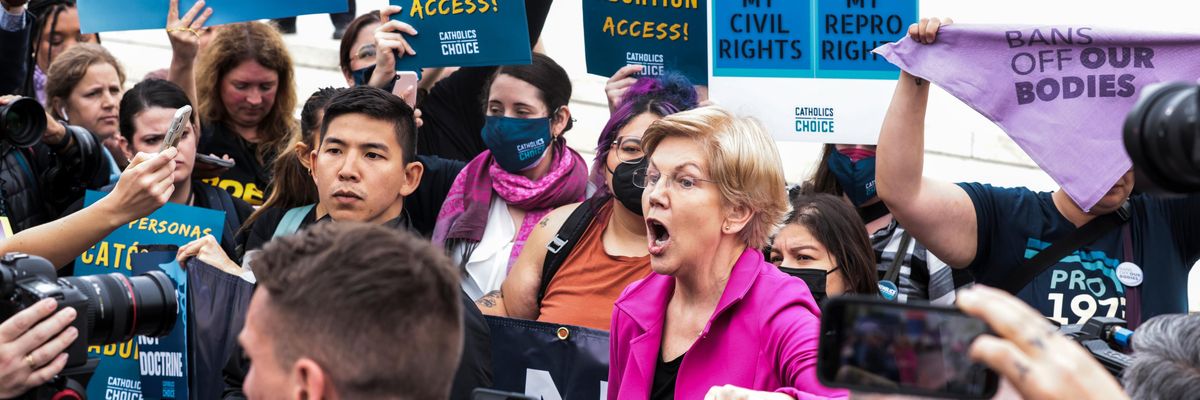

SUBSCRIBE TO OUR FREE NEWSLETTER
Daily news & progressive opinion—funded by the people, not the corporations—delivered straight to your inbox.
5
#000000
#FFFFFF
To donate by check, phone, or other method, see our More Ways to Give page.


Daily news & progressive opinion—funded by the people, not the corporations—delivered straight to your inbox.

Sen. Elizabeth Warren (D-Mass.) speaks to pro-choice demonstrators outside of the U.S. Supreme Court Building in Washington, D.C. on May 3, 2022 after the publication of a leaked draft opinion signifying the reversal of Roe v. Wade. (Photo: Oliver Contreras/The Washington Post via Getty Images)
In the wake of last week's leaked Supreme Court draft opinion reversing Roe v. Wade, U.S. Sen. Elizabeth Warren on Monday laid out a roadmap for ensuring reproductive freedom, vowing "to do everything I can" to prevent right-wing ideologues from rolling back hard-fought human rights.
"The Republicans have planned long and hard for this day, and we can't wait a second longer to fight back. We need action."
"Let me be crystal clear: Republicans in Congress are planning to restrict abortion access and reproductive healthcare everywhere, endangering all Americans, whether they live in red, blue, or purple states," Warren (D-Mass.) wrote in a Marie Claire op-ed. "And it is equally clear that the Supreme Court is opening the door to banning birth control, outlawing marriage equality, and even making interracial marriage illegal."
"American freedoms and the Constitution itself are under attack," she added. "The Republicans have planned long and hard for this day, and we can't wait a second longer to fight back. We need action."
That, said Warren, means codifying abortion rights at the federal level, abolishing the filibuster in the Senate, and getting out the vote and electing pro-choice Democrats in this November's congressional midterms.
Warren noted that "Congress has the power to make Roe the law of the entire nation" by passing the Women's Health Protection Act (WHPA). First introduced by Rep. Judy Chu (D-Calif.) in 2013, the measure would prohibit "governmental restrictions on the provision of, and access to, abortion services."
After a Texas law empowering anti-choice vigilantes to sue and collect bounties on anyone who "aids or abets" an abortion after six weeks of pregnancy took effect last year, every Democratic member of the House except Rep. Henry Cuellar (D-Texas) voted last September to pass the WHPA.
However, right-wing Democratic Sen. Joe Manchin of West Virginia joined Republicans in the upper chamber in filibustering the bill, sparking renewed calls to abolish the arcane procedure that has repeatedly been used to block progressive proposals. On Monday, Senate Majority Leader Chuck Schumer (D-N.Y.) said the upper chamber will vote on a modified--critics say stripped-down--WHPA on Wednesday.
Related Content

Last week, Warren said that it is "long past time" to pass the WHPA, "and we can't let the filibuster stand in our way."
In her Marie Claire op-ed, she stressed that senators "should debate that bill on the floor and then vote on it--because every American should know exactly where we stand and hold us accountable. But to get that vote and protect Roe, we must end the filibuster."
Warren also stressed the need for reproductive rights defenders to vote in the upcoming congressional midterm elections.
"This November, Americans will decide the future of Roe, and voters everywhere must bring their fury to the voting booth," she said. "Yes, I'm angry that a group of unelected ideologues on the Supreme Court think they can turn current law upside down and dictate to tens of millions of people across this country the terms of their pregnancies and their lives."
Related Content

"I will use my anger to do everything I can to keep an extremist Supreme Court from having the last word on the right to a safe and legal abortion," the senator added. "In a democracy, that power is in the hands of the people. We need to use our anger to make real change. We're not going back--never."
Efforts to codify reproductive rights at the federal level began even before the Roe v. Wade ruling was announced. Applauding the "historic and giant step toward the recognition of the rights of women to control their own bodies," then-Rep. Bella Abzug (D-N.Y.) asserted the day after the 1973 Roe decision that the "next step" must be passage of her Abortion Rights Act, which would "eliminate any state laws of any nature concerning the regulation of abortion."
Abzug foresaw the sustained Republican-led attacks on reproductive rights that followed the landmark ruling. At the federal level, the Hyde Amendment has blocked Medicaid funding of abortion services since 1976, a policy disproportionately affecting women of color. Meanwhile, a majority of U.S. states have passed laws banning or limiting abortions, or triggering bans in the event Roe is overturned.
"The minute Roe is officially gone, more than half the states in this country are poised to outlaw abortion or severely limit abortion access," wrote Warren. "If abortion is outlawed, the impact won't fall equally on everyone. Wealthy women will still get safe, legal abortions by flying to another state or even traveling to another country."
"But the world will be very different for those who have the least power: low-income women, young women, women of color, victims of incest and abuse, moms already working two jobs to support their children," she added.
Related Content

Other previous attempts to codify reproductive rights include the Freedom of Choice Act--first introduced in 1989--which affirmed that "every woman has the fundamental right to choose to bear a child, terminate a pregnancy prior to fetal viability, or terminate a pregnancy after viability when necessary to protect her life or her health."
"For me, this isn't about politics, this is personal."
Then-U.S. Sen. Barack Obama (D-Ill.) co-sponsored the legislation. While campaigning for president in 2007, he vowed that "the first thing" he would do if elected is sign the bill into law. However, despite Democrats controlling both houses of Congress at the time, the Freedom of Choice Act failed to become law, and in 2009 Obama said that the bill was "not highest legislative priority."
Warren says that "for me, this isn't about politics, this is personal."
"I have lived in a world where abortion was illegal," she wrote. "I learned early on that when the law bans all abortions, only safe and legal abortions will be banned. I lived in a world in which women bled to death from back-alley abortions. A world in which infections and other complications destroyed women's futures. A world in which some women took their own lives rather than continuing with a pregnancy they could not bear."
"The Supreme Court does not get the last word," Warren emphasized. "The American people--through their leaders in Congress--can and must take action."
Dear Common Dreams reader, The U.S. is on a fast track to authoritarianism like nothing I've ever seen. Meanwhile, corporate news outlets are utterly capitulating to Trump, twisting their coverage to avoid drawing his ire while lining up to stuff cash in his pockets. That's why I believe that Common Dreams is doing the best and most consequential reporting that we've ever done. Our small but mighty team is a progressive reporting powerhouse, covering the news every day that the corporate media never will. Our mission has always been simple: To inform. To inspire. And to ignite change for the common good. Now here's the key piece that I want all our readers to understand: None of this would be possible without your financial support. That's not just some fundraising cliche. It's the absolute and literal truth. We don't accept corporate advertising and never will. We don't have a paywall because we don't think people should be blocked from critical news based on their ability to pay. Everything we do is funded by the donations of readers like you. Will you donate now to help power the nonprofit, independent reporting of Common Dreams? Thank you for being a vital member of our community. Together, we can keep independent journalism alive when it’s needed most. - Craig Brown, Co-founder |
In the wake of last week's leaked Supreme Court draft opinion reversing Roe v. Wade, U.S. Sen. Elizabeth Warren on Monday laid out a roadmap for ensuring reproductive freedom, vowing "to do everything I can" to prevent right-wing ideologues from rolling back hard-fought human rights.
"The Republicans have planned long and hard for this day, and we can't wait a second longer to fight back. We need action."
"Let me be crystal clear: Republicans in Congress are planning to restrict abortion access and reproductive healthcare everywhere, endangering all Americans, whether they live in red, blue, or purple states," Warren (D-Mass.) wrote in a Marie Claire op-ed. "And it is equally clear that the Supreme Court is opening the door to banning birth control, outlawing marriage equality, and even making interracial marriage illegal."
"American freedoms and the Constitution itself are under attack," she added. "The Republicans have planned long and hard for this day, and we can't wait a second longer to fight back. We need action."
That, said Warren, means codifying abortion rights at the federal level, abolishing the filibuster in the Senate, and getting out the vote and electing pro-choice Democrats in this November's congressional midterms.
Warren noted that "Congress has the power to make Roe the law of the entire nation" by passing the Women's Health Protection Act (WHPA). First introduced by Rep. Judy Chu (D-Calif.) in 2013, the measure would prohibit "governmental restrictions on the provision of, and access to, abortion services."
After a Texas law empowering anti-choice vigilantes to sue and collect bounties on anyone who "aids or abets" an abortion after six weeks of pregnancy took effect last year, every Democratic member of the House except Rep. Henry Cuellar (D-Texas) voted last September to pass the WHPA.
However, right-wing Democratic Sen. Joe Manchin of West Virginia joined Republicans in the upper chamber in filibustering the bill, sparking renewed calls to abolish the arcane procedure that has repeatedly been used to block progressive proposals. On Monday, Senate Majority Leader Chuck Schumer (D-N.Y.) said the upper chamber will vote on a modified--critics say stripped-down--WHPA on Wednesday.
Related Content

Last week, Warren said that it is "long past time" to pass the WHPA, "and we can't let the filibuster stand in our way."
In her Marie Claire op-ed, she stressed that senators "should debate that bill on the floor and then vote on it--because every American should know exactly where we stand and hold us accountable. But to get that vote and protect Roe, we must end the filibuster."
Warren also stressed the need for reproductive rights defenders to vote in the upcoming congressional midterm elections.
"This November, Americans will decide the future of Roe, and voters everywhere must bring their fury to the voting booth," she said. "Yes, I'm angry that a group of unelected ideologues on the Supreme Court think they can turn current law upside down and dictate to tens of millions of people across this country the terms of their pregnancies and their lives."
Related Content

"I will use my anger to do everything I can to keep an extremist Supreme Court from having the last word on the right to a safe and legal abortion," the senator added. "In a democracy, that power is in the hands of the people. We need to use our anger to make real change. We're not going back--never."
Efforts to codify reproductive rights at the federal level began even before the Roe v. Wade ruling was announced. Applauding the "historic and giant step toward the recognition of the rights of women to control their own bodies," then-Rep. Bella Abzug (D-N.Y.) asserted the day after the 1973 Roe decision that the "next step" must be passage of her Abortion Rights Act, which would "eliminate any state laws of any nature concerning the regulation of abortion."
Abzug foresaw the sustained Republican-led attacks on reproductive rights that followed the landmark ruling. At the federal level, the Hyde Amendment has blocked Medicaid funding of abortion services since 1976, a policy disproportionately affecting women of color. Meanwhile, a majority of U.S. states have passed laws banning or limiting abortions, or triggering bans in the event Roe is overturned.
"The minute Roe is officially gone, more than half the states in this country are poised to outlaw abortion or severely limit abortion access," wrote Warren. "If abortion is outlawed, the impact won't fall equally on everyone. Wealthy women will still get safe, legal abortions by flying to another state or even traveling to another country."
"But the world will be very different for those who have the least power: low-income women, young women, women of color, victims of incest and abuse, moms already working two jobs to support their children," she added.
Related Content

Other previous attempts to codify reproductive rights include the Freedom of Choice Act--first introduced in 1989--which affirmed that "every woman has the fundamental right to choose to bear a child, terminate a pregnancy prior to fetal viability, or terminate a pregnancy after viability when necessary to protect her life or her health."
"For me, this isn't about politics, this is personal."
Then-U.S. Sen. Barack Obama (D-Ill.) co-sponsored the legislation. While campaigning for president in 2007, he vowed that "the first thing" he would do if elected is sign the bill into law. However, despite Democrats controlling both houses of Congress at the time, the Freedom of Choice Act failed to become law, and in 2009 Obama said that the bill was "not highest legislative priority."
Warren says that "for me, this isn't about politics, this is personal."
"I have lived in a world where abortion was illegal," she wrote. "I learned early on that when the law bans all abortions, only safe and legal abortions will be banned. I lived in a world in which women bled to death from back-alley abortions. A world in which infections and other complications destroyed women's futures. A world in which some women took their own lives rather than continuing with a pregnancy they could not bear."
"The Supreme Court does not get the last word," Warren emphasized. "The American people--through their leaders in Congress--can and must take action."
In the wake of last week's leaked Supreme Court draft opinion reversing Roe v. Wade, U.S. Sen. Elizabeth Warren on Monday laid out a roadmap for ensuring reproductive freedom, vowing "to do everything I can" to prevent right-wing ideologues from rolling back hard-fought human rights.
"The Republicans have planned long and hard for this day, and we can't wait a second longer to fight back. We need action."
"Let me be crystal clear: Republicans in Congress are planning to restrict abortion access and reproductive healthcare everywhere, endangering all Americans, whether they live in red, blue, or purple states," Warren (D-Mass.) wrote in a Marie Claire op-ed. "And it is equally clear that the Supreme Court is opening the door to banning birth control, outlawing marriage equality, and even making interracial marriage illegal."
"American freedoms and the Constitution itself are under attack," she added. "The Republicans have planned long and hard for this day, and we can't wait a second longer to fight back. We need action."
That, said Warren, means codifying abortion rights at the federal level, abolishing the filibuster in the Senate, and getting out the vote and electing pro-choice Democrats in this November's congressional midterms.
Warren noted that "Congress has the power to make Roe the law of the entire nation" by passing the Women's Health Protection Act (WHPA). First introduced by Rep. Judy Chu (D-Calif.) in 2013, the measure would prohibit "governmental restrictions on the provision of, and access to, abortion services."
After a Texas law empowering anti-choice vigilantes to sue and collect bounties on anyone who "aids or abets" an abortion after six weeks of pregnancy took effect last year, every Democratic member of the House except Rep. Henry Cuellar (D-Texas) voted last September to pass the WHPA.
However, right-wing Democratic Sen. Joe Manchin of West Virginia joined Republicans in the upper chamber in filibustering the bill, sparking renewed calls to abolish the arcane procedure that has repeatedly been used to block progressive proposals. On Monday, Senate Majority Leader Chuck Schumer (D-N.Y.) said the upper chamber will vote on a modified--critics say stripped-down--WHPA on Wednesday.
Related Content

Last week, Warren said that it is "long past time" to pass the WHPA, "and we can't let the filibuster stand in our way."
In her Marie Claire op-ed, she stressed that senators "should debate that bill on the floor and then vote on it--because every American should know exactly where we stand and hold us accountable. But to get that vote and protect Roe, we must end the filibuster."
Warren also stressed the need for reproductive rights defenders to vote in the upcoming congressional midterm elections.
"This November, Americans will decide the future of Roe, and voters everywhere must bring their fury to the voting booth," she said. "Yes, I'm angry that a group of unelected ideologues on the Supreme Court think they can turn current law upside down and dictate to tens of millions of people across this country the terms of their pregnancies and their lives."
Related Content

"I will use my anger to do everything I can to keep an extremist Supreme Court from having the last word on the right to a safe and legal abortion," the senator added. "In a democracy, that power is in the hands of the people. We need to use our anger to make real change. We're not going back--never."
Efforts to codify reproductive rights at the federal level began even before the Roe v. Wade ruling was announced. Applauding the "historic and giant step toward the recognition of the rights of women to control their own bodies," then-Rep. Bella Abzug (D-N.Y.) asserted the day after the 1973 Roe decision that the "next step" must be passage of her Abortion Rights Act, which would "eliminate any state laws of any nature concerning the regulation of abortion."
Abzug foresaw the sustained Republican-led attacks on reproductive rights that followed the landmark ruling. At the federal level, the Hyde Amendment has blocked Medicaid funding of abortion services since 1976, a policy disproportionately affecting women of color. Meanwhile, a majority of U.S. states have passed laws banning or limiting abortions, or triggering bans in the event Roe is overturned.
"The minute Roe is officially gone, more than half the states in this country are poised to outlaw abortion or severely limit abortion access," wrote Warren. "If abortion is outlawed, the impact won't fall equally on everyone. Wealthy women will still get safe, legal abortions by flying to another state or even traveling to another country."
"But the world will be very different for those who have the least power: low-income women, young women, women of color, victims of incest and abuse, moms already working two jobs to support their children," she added.
Related Content

Other previous attempts to codify reproductive rights include the Freedom of Choice Act--first introduced in 1989--which affirmed that "every woman has the fundamental right to choose to bear a child, terminate a pregnancy prior to fetal viability, or terminate a pregnancy after viability when necessary to protect her life or her health."
"For me, this isn't about politics, this is personal."
Then-U.S. Sen. Barack Obama (D-Ill.) co-sponsored the legislation. While campaigning for president in 2007, he vowed that "the first thing" he would do if elected is sign the bill into law. However, despite Democrats controlling both houses of Congress at the time, the Freedom of Choice Act failed to become law, and in 2009 Obama said that the bill was "not highest legislative priority."
Warren says that "for me, this isn't about politics, this is personal."
"I have lived in a world where abortion was illegal," she wrote. "I learned early on that when the law bans all abortions, only safe and legal abortions will be banned. I lived in a world in which women bled to death from back-alley abortions. A world in which infections and other complications destroyed women's futures. A world in which some women took their own lives rather than continuing with a pregnancy they could not bear."
"The Supreme Court does not get the last word," Warren emphasized. "The American people--through their leaders in Congress--can and must take action."